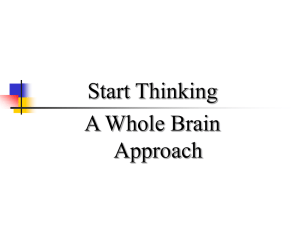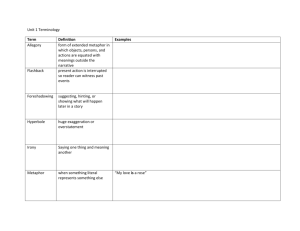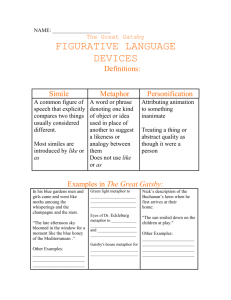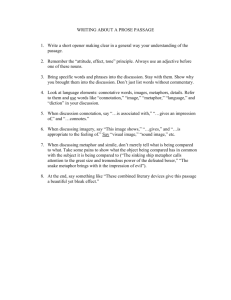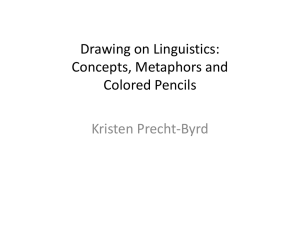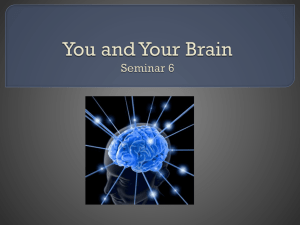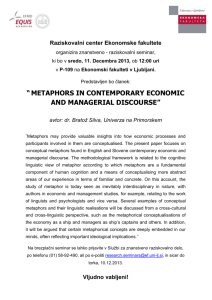File
advertisement
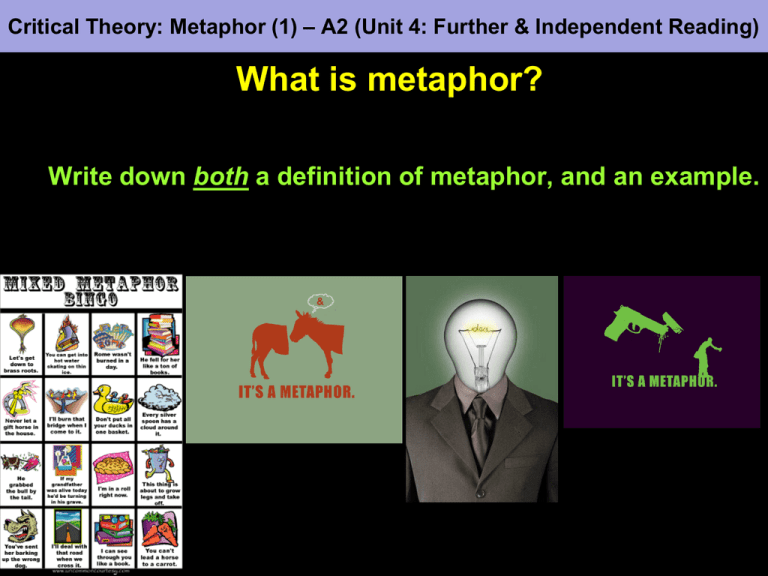
Critical Theory: Metaphor (1) – A2 (Unit 4: Further & Independent Reading) What is metaphor? Write down both a definition of metaphor, and an example. Critical Theory: Metaphor (1) – A2 (Unit 4: Further & Independent Reading) The Standard View of Metaphor Words or phrases with “hidden” meanings; we readers have to search for or “decipher” the hidden meanings. I.A. Richards Metaphors divided into two parts 1) Vehicle – the words/phrases used 2) Tenor – the “hidden”/metaphorical meanings of the “vehicle.” Does this model work? NOTE: According to this logic, “vehicle” and “tenor” are surely metaphors for discussing metaphors... Critical Theory: Metaphor (1) – A2 (Unit 4: Further & Independent Reading) Why/how is this metaphor? All the world’s a stage, And all the men and women merely players; Why/how is this not metaphorical? There’s the tree. “TREE” Critical Theory: Metaphor (1) – A2 (Unit 4: Further & Independent Reading) How does language “hook onto the world”? How are you able to understand “There’s the tree”? “TREE” Signifier Signified Critical Theory: Metaphor (1) – A2 (Unit 4: Further & Independent Reading) One view: All language is metaphorical; but words that have the surprise or “magic” of metaphor can be counted as “live” metaphors, while metaphors that pass unnoticed are “dead metaphors” (e.g., “table leg”). Two aliens, Bouba and Kiki, have just arrived on Earth. They look like this: But which one’s Bouba, and which is Kiki? Decide, then discuss, briefly, with a partner The Bouba-Kiki Effect Bouba Kiki TheSome same scientists brain In “Bouba-Kiki,” we wonder if this ability scientists think that think that people to make new and the human mind is strange make aconnections connection able to make links between unrelated between the harsh (“crossbetween things that “K”things sounds of “Kiki” domain mapping”) dothe not have or and cutting might explain our obvious jagged shape. ability to make connections... metaphors. Kiki Bouba 95%-98% of people opt for this one. But why?... Critical Theory: Metaphor (1) – A2 (Unit 4: Further & Independent Reading) Two views that differ from Richards, but agree with Bouba and Kiki... Donald Davidson Metaphor is not a matter not of meaning (“tree = ) Metaphor is a matter of language in use Metaphor works by association That is, words can over ever have their “literal” meaning – think about the relationship of “tree and or “table leg” and But “live” metaphor happens when familiar words are used in strange ways. Richard Rorty (influenced by Davidson) The physical, real world IS “out there,” but our relationship to it is made in and by language. The “world does not speak Newtonian” just because Newton’s science was better than Aristotle’s. Therefore, metaphor is invention/innovation. Creativity is the act of “redescription” or “remetaphorization.” Critical Theory: Metaphor (1) – A2 (Unit 4: Further & Independent Reading) All the world's a stage, And all the men and women merely players; They have their exits and their entrances, And one man in his time plays many parts, His acts being seven ages. At first, the infant, Mewling and puking in the nurse's arms. Then the whining schoolboy, with his satchel And shining morning face, creeping like snail Unwillingly to school. And then the lover, Sighing like furnace, with a woeful ballad Made to his mistress' eyebrow. Then a soldier, Full of strange oaths and bearded like the pard, Jealous in honor, sudden and quick in quarrel, Seeking the bubble reputation Even in the cannon's mouth. And then the justice, In fair round belly with good capon lined, With eyes severe and beard of formal cut, Full of wise saws and modern instances; And so he plays his part. The sixth age shifts Into the lean and slippered pantaloon, With spectacles on nose and pouch on side; His youthful hose, well saved, a world too wide For his shrunk shank, and his big manly voice, Turning again toward childish treble, pipes And whistles in his sound. Last scene of all, That ends this strange eventful history, Is second childishness and mere oblivion, Sans teeth, sans eyes, sans taste, sans everything.
